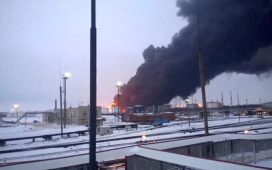Current international emissions goals do not properly incorporate up-to-date science on carbon emission feedback loops in the Arctic, according to commentary published Monday in Proceedings of the National Academy of Sciences.
Researchers from the Woodwell Climate Research Center in Massachusetts wrote that most warming models do not account for climate events in the Arctic that can trigger such loops. These include carbon emissions from melting permafrost, extreme amounts of carbon released during wildfires and heatwaves in regions like Siberia.
“Based on what we already know about abrupt thaw and wildfire, these feedback loops are likely to substantially exacerbate the permafrost thaw feedback and resulting carbon emissions,” Woodwell researcher and paper co-author Rachael Treharne said in a statement on Monday. “Unless our models account for these anticipated effects, we’ll be missing a major piece of the carbon puzzle.”
“Recognizing the likely inevitability of over-shooting the 1.5 °C target, there is an urgent need to quantify and account for the compounding impact of overshoot magnitude and duration on climate feedbacks, such as permafrost thaw,” the researchers wrote. Accordingly, they added, international governments should update the Paris climate agreement’s provisions to incorporate this changing understanding.
There are currently no global models that include issues like abrupt thawing, possible soil combustion and how fires could affect permafrost vulnerability, the researchers note. Policymakers, they wrote, should factor Arctic emissions data into both climate models and carbon budgets as well as risk assessments relating to warming.
“The science alone is not enough,” Philip Duffy, president and executive director of the Woodwell Climate Research Center and commentary co-author, said in a statement. “We urgently need communication between scientific and policy communities to make sure our climate policies are effective in addressing the scale and scope of the climate crisis.”









